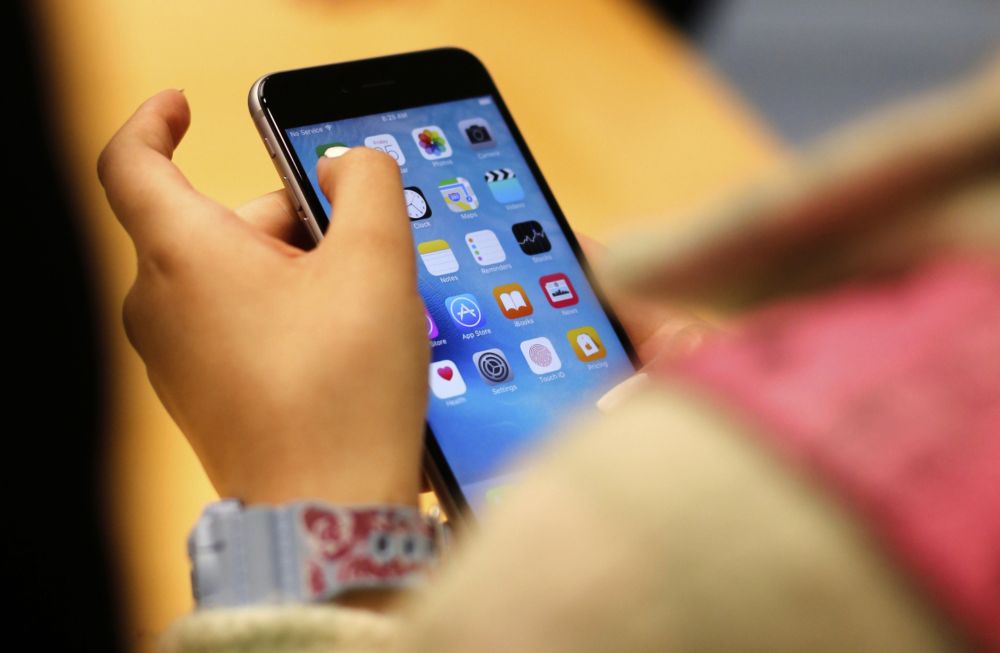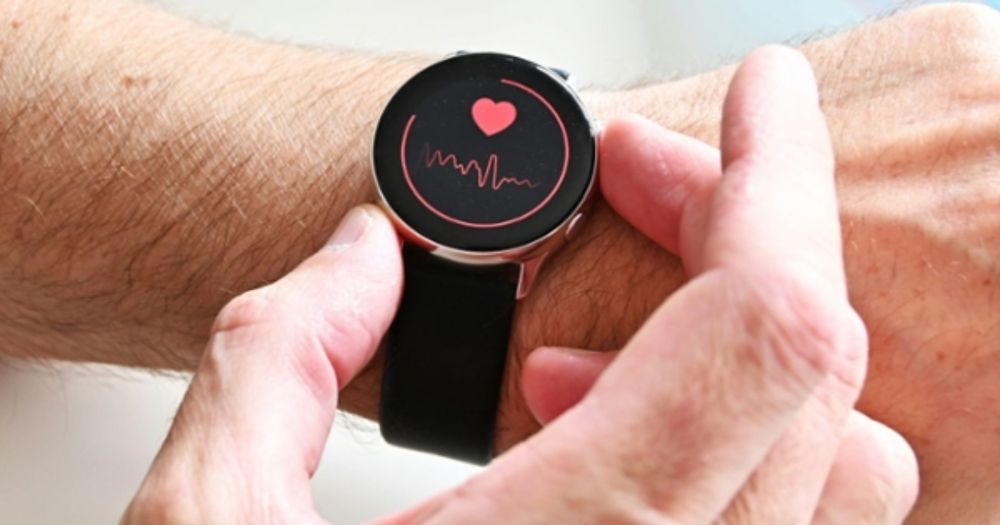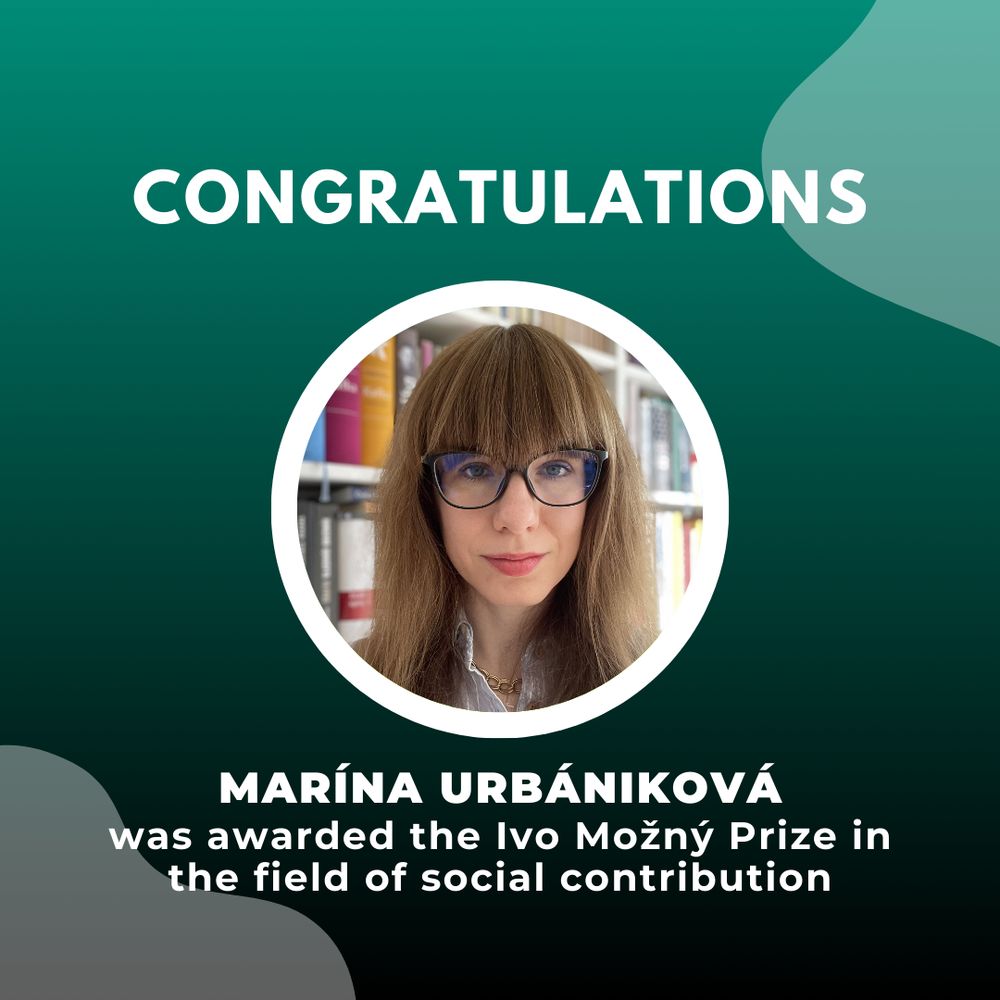Přečtěte si náš nový report o digitálním well-beingu v Česku. ❤️🩹📖
Přinášíme reprezentativní data o tom, jak česká dospělá populace prožívá svůj život s technologiemi – co jí dává inspiraci a radost, ale také kde přináší stres a ztrátu kontroly.💡
irtis.muni.cz/cs/aktuality...
08.09.2025 11:09 — 👍 2 🔁 2 💬 0 📌 0
Join us next year in Brno!!! ❤️
08.09.2025 13:41 — 👍 2 🔁 0 💬 0 📌 0
![CRISPR as a microbial immune system
In 2003, Mojica wrote the first paper suggesting that CRISPR was an innate microbial immune system. The paper was rejected by a series of high-profile journals, including Nature, Proceedings of the National Academy of Sciences, Molecular Microbiology and Nucleic Acids Research, before finally being accepted by Journal of Molecular Evolution in February, 2005.[3][4]](https://cdn.bsky.app/img/feed_thumbnail/plain/did:plc:73aicoale2mqwrap63rdzwep/bafkreibu3dburfn527r3sbu2ov6y7gebv6zopaznagnfytjtsn6y4k7cs4@jpeg)
CRISPR as a microbial immune system
In 2003, Mojica wrote the first paper suggesting that CRISPR was an innate microbial immune system. The paper was rejected by a series of high-profile journals, including Nature, Proceedings of the National Academy of Sciences, Molecular Microbiology and Nucleic Acids Research, before finally being accepted by Journal of Molecular Evolution in February, 2005.[3][4]
TIL the original paper describing CRISPR, by Francisco Mojica, was rejected by 4 journals and took 2 years to be published
17.08.2025 04:00 — 👍 301 🔁 78 💬 6 📌 10
Home - Society for Ambulatory Assessment conference (SAA 2026) - OMP, University of Vienna
If you enjoyed #ICBM2025 and use Ambulatory Assessment/ Ecological Momentary Assessment methods, consider planning another trip to Vienna next year: @ambulatory-assessment.org will meet here on 3-5 August 2026 #SAA2026. More info soon on univie.eventsair.com/saa2026/
09.08.2025 09:02 — 👍 14 🔁 6 💬 1 📌 2
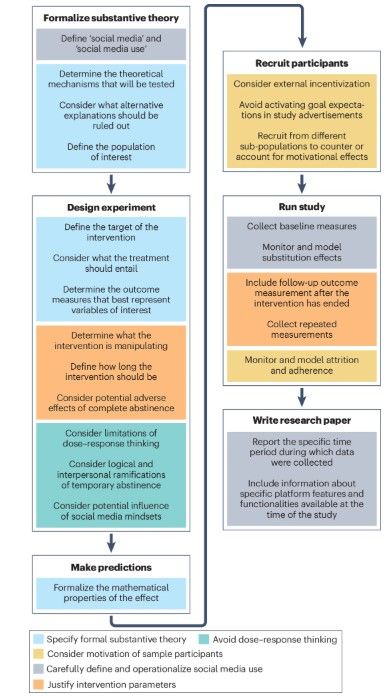
Methodological considerations for social media intervention studies
Perspective by Mariek M. P. Vanden Abeele, Stephen L. Murphy, Laura Lemahieu & Ernst H. W. Koster
🚨FREE🚨web access (with registration) until Aug 28: go.nature.com/45cerHT
PDF: rdcu.be/eyaz8
28.07.2025 13:37 — 👍 11 🔁 6 💬 0 📌 1
OSF
Finally :) Preprint of Susanne Baumgartner and my paper Short but still valid: Validating Single-Item Measures for Key Communication Science Constructs for Experience Sampling Research.
In a 5-Study procedure, we assess the validity of in total 21 constructs osf.io/preprints/ps...
14.07.2025 08:19 — 👍 24 🔁 10 💬 4 📌 1
🥳🥳🥳
14.07.2025 21:10 — 👍 1 🔁 0 💬 0 📌 0
Happy to share my new study, publ. in Social Science Research 🎉 Bottom line: Yes, adolescents use their phones a lot 🤳 But I find no support for the notion that this use displaces reading, homework, hobbies, physical act., sleep... Instead: Changing media preferences 📺 ->📱. doi.org/10.1016/j.ss...
07.07.2025 10:12 — 👍 45 🔁 16 💬 4 📌 0
Non-academics: if you see an interesting academic paper on here and you can’t access it due to a paywall just email the author and (depending on the state of their inbox 😜) they will generally be thrilled you are interested in their work and send you a copy.
08.07.2025 19:43 — 👍 336 🔁 102 💬 14 📌 17
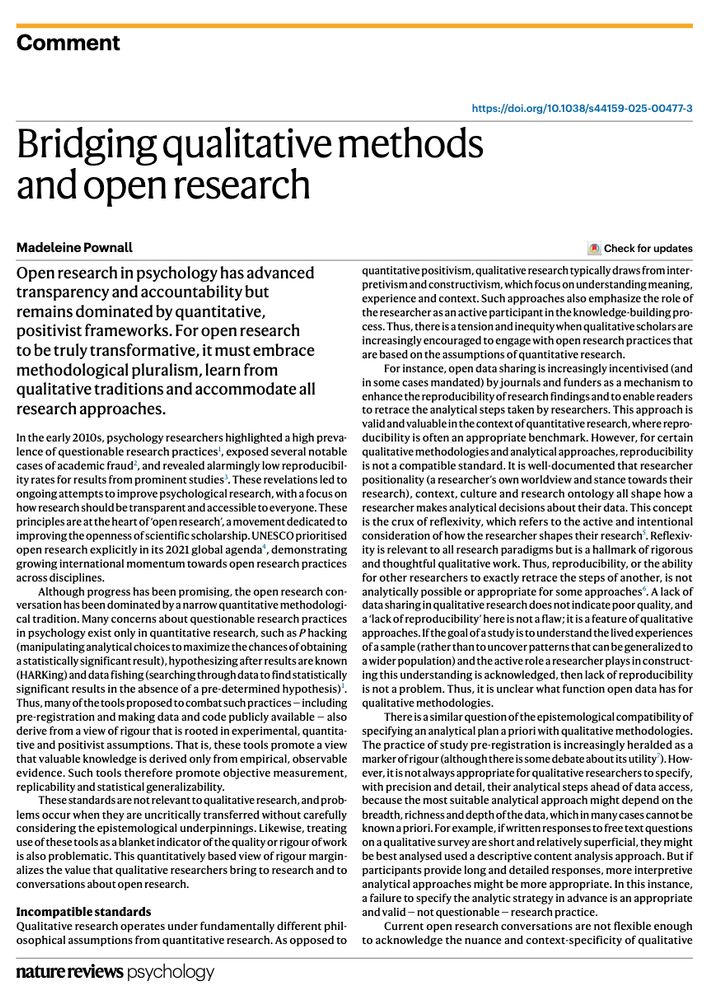
A screenshot of the paper, titled "Bridging qualitative methods and open research"
My comment about open research and qualitative methods is out! I argue that open research needs to take seriously the notion that "rigour" looks different for different methods and can learn from qualitative traditions. It feels very apt to be at #QMIP2025 for this publication day rdcu.be/evEpk
10.07.2025 12:34 — 👍 62 🔁 15 💬 2 📌 2
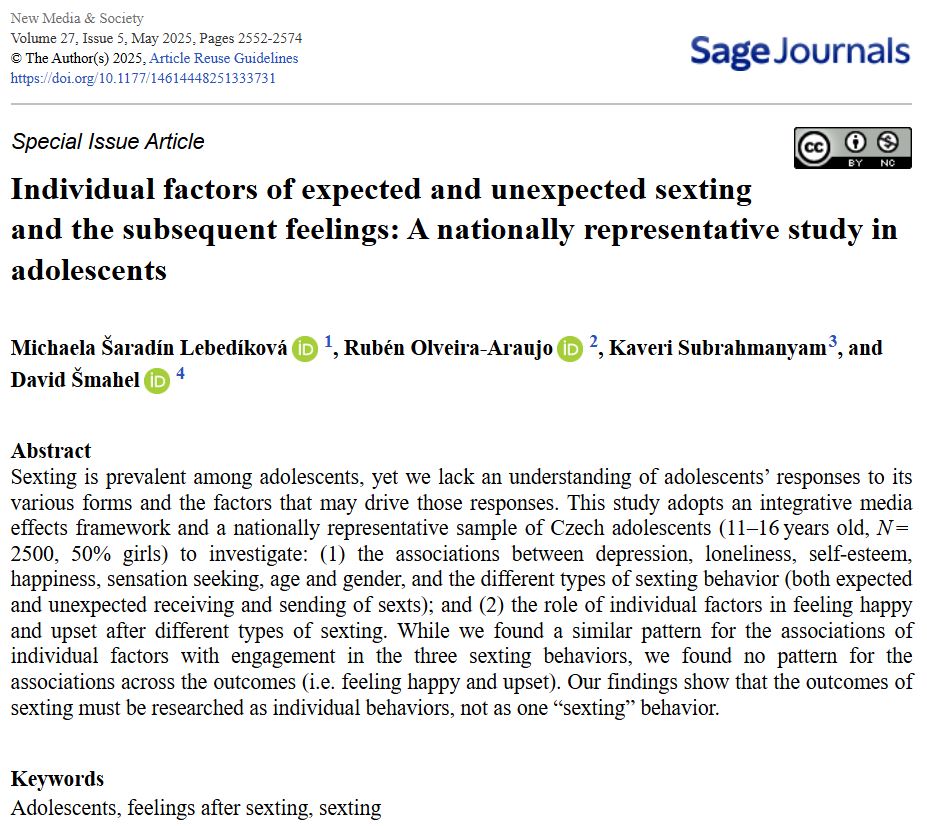
Our paper (with @davidsmahel.bsky.social and others) on how adolescents feel after sexting has been recently published in New Media and Society! You can read the study here: doi.org/10.1177/1461... (🔑 open access)
02.07.2025 08:47 — 👍 4 🔁 0 💬 0 📌 0

Abstract:
Building on the idea that subjective evaluations of social media use (SMU) may shape well-being effects, this study investigated how two “social media mindsets”—agency (perceived control over SMU) and valence (perceived effects of SMU)—relate to self-reported and logged SMU, and four well-being indicators (depression, anxiety, stress, and life satisfaction) in a South African sample of young adults (N = 1,858; M age = 21.01). Agency mindsets were negatively correlated with SMU and positively with well-being, while valence mindsets were associated with higher SMU but not with well-being. Logged SMU showed weaker associations with mindsets and well-being than self-reported SMU, suggesting differences between perceived and actual behavior. The findings replicate, extend, and in some cases contradict prior research, emphasizing how users’ sense of control is more important for well-being than SMU duration or perceptions of its effects, and that more work is needed to understand whether the “mindsets” concept is fruitful.
Lay summary:
This study investigated how young adults’ feelings about social media—whether they feel in control of their use (agency) or view it positively (valence)—relate to their actual use and mental well-being. The study involved 1,858 participants from South Africa using both self-reported and actual logged social media usage data. The results show that people who feel more in control of their social media use tend to use it less and report better mental well-being. In contrast, those who see social media as more positive spend more time on it, but this mindset did not directly relate to well-being. The data collected from logs of actual usage show weaker relations with well-being compared to people’s estimates and to their mindsets. These findings suggest that a person’s sense of control over social media plays a more important role in their mental health than how much time they spend on it.
New in JCMC with @bronwynec.bsky.social: People who feel more in control of their social media use tend to use it less and report better well-being. Seeing social media as positive was associated with more use, but not well-being. 👉 doi.org/10.1093/jcmc...
30.06.2025 07:34 — 👍 24 🔁 6 💬 1 📌 0
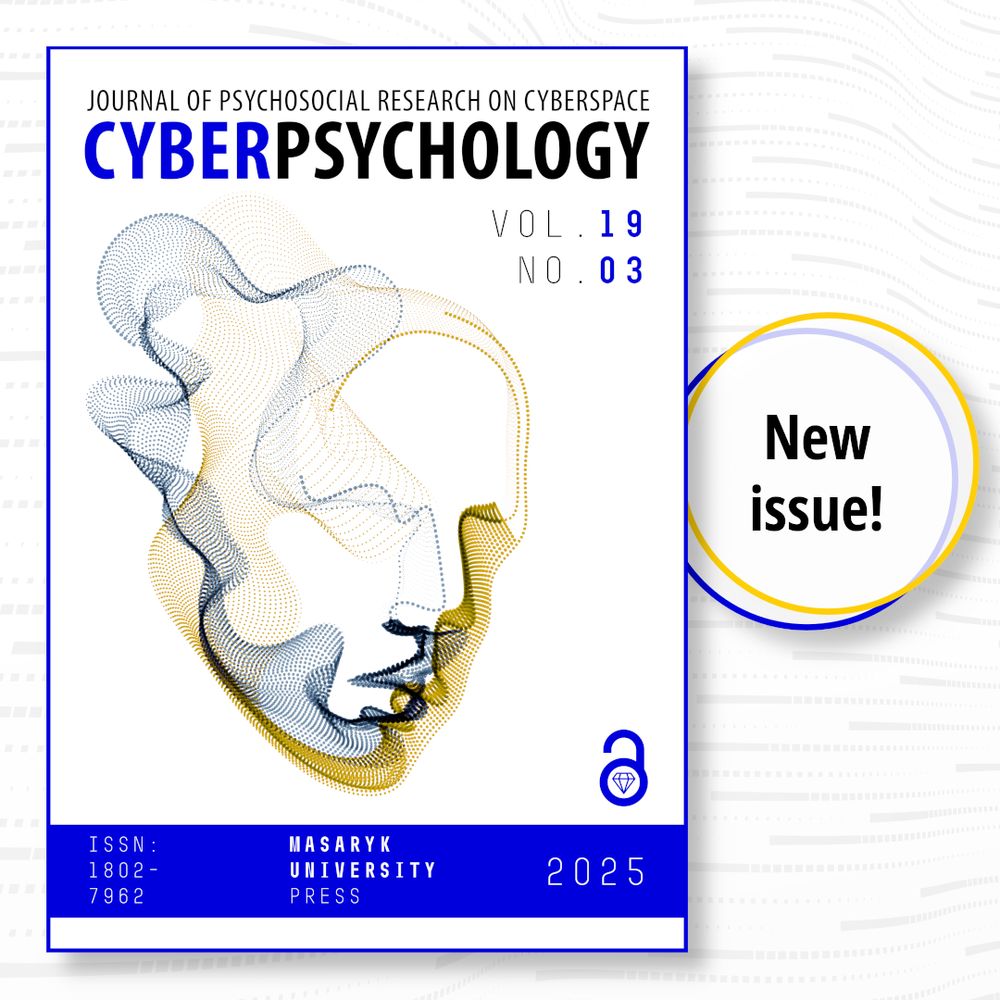
🌞 New issue is here! 🌞
Vol. 19, No. 3 features 2 new validated measures, 3 longitudinal studies on social media use, and much more - see 🧵👇
📚 Cool off with a smart summer read: cyberpsychology.eu/issue/view/2...
All #OpenAccess 🔓
Heartfelt thanks to everyone who helped bring this issue to life! 🙌
30.06.2025 16:48 — 👍 10 🔁 6 💬 1 📌 0

Next year, the SAA annual conference will take place in Vienna. Professor Laura M. König and the Health Psychology Group will host us from 3 to 5 August 2026. An online participation option will be offered for those who are unable to travel to Vienna. More information will follow soon on the conference website: https://univie.eventsair.com/saa2026/
Stay tuned for #SAA2026! We at #HPGVienna @univie.ac.at are very much looking forward to welcoming @ambulatory-assessment.org and you to our beautiful city. Abstract submission will open on December 1st. More information will be published soon on the conference website: univie.eventsair.com/saa2026/
21.06.2025 17:02 — 👍 17 🔁 4 💬 0 📌 0
It is and you must ❤️
23.06.2025 20:50 — 👍 1 🔁 0 💬 0 📌 0
🤣
20.06.2025 07:49 — 👍 1 🔁 0 💬 0 📌 0
The Workshop on Aggression is still open for submissions! Please, share among your colleagues interested in aggression-related research. 💙 Brno awaits you. :) Submissions about media and digital-related forms of aggression, but also traditional aggression are welcomed.
#conference #woa2025
16.06.2025 18:08 — 👍 1 🔁 1 💬 0 📌 0

Miss #ica25 already? ⛰️ Luckily, the post-ICA @icamobile.bsky.social hangouts are right around the corner! We'll be chatting informally about ICA et al ☕ you don't need to have attended ICA to join! Here's the link: tinyurl.com/icamobileevent (password: ICAMOBILE)
17.06.2025 13:10 — 👍 15 🔁 4 💬 1 📌 2


And then I presented our paper on smartphone use and stress, which we co-authored with @davidlacko.bsky.social @davidsmahel.bsky.social and Ine Beyens from @ascor.bsky.social
You can read our pre-print here: osf.io/preprints/ps...
20.06.2025 07:17 — 👍 3 🔁 0 💬 0 📌 0
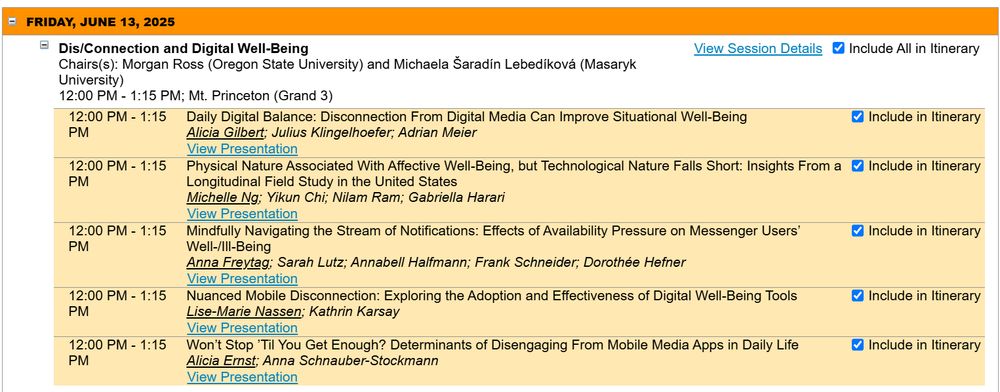
We also chaired an amazing panel with @mqrmobile.bsky.social 👉 Be sure to check out these amazing researchers! @aliciagilbert.bsky.social Michelle Ng @annafreytag.bsky.social @lisemarienassen.bsky.social @aliciaernst.bsky.social
20.06.2025 07:11 — 👍 3 🔁 0 💬 1 📌 0


Back from my first ICA @icahdq.bsky.social 😍 Started off with the @icamobile.bsky.social pre-conference, where we co-organized a workshop - a big thank you especially to @aanixel.bsky.social @danilkowa.bsky.social @joebayer.bsky.social @aliciagilbert.bsky.social Arturo Cocchi
20.06.2025 07:08 — 👍 6 🔁 0 💬 1 📌 0
Fun times with the bear / in the shade!
15.06.2025 03:35 — 👍 8 🔁 3 💬 0 📌 0


Had a wonderful start to #ICA25 today at the @icamobile.bsky.social precon! Thanks to @joebayer.bsky.social @larawolfers.bsky.social and @aliciagilbert.bsky.social for collaborating on a flash talk and @danilkowa.bsky.social for helping co-lead-organize a wonderful workshop on #neurodiversity ✨✨
12.06.2025 06:36 — 👍 14 🔁 3 💬 0 📌 0
Don't miss the ICA Affiliate Journals: Global Top Papers Session — a showcase of cutting-edge research from around the world, selected by ICA’s affiliate journals.
📅 Friday, 13 June |📍 #ICA25 Denver buff.ly/De6K6eC
06.06.2025 13:05 — 👍 3 🔁 1 💬 0 📌 0
it’s a calling we live for this
19.04.2025 21:04 — 👍 12 🔁 2 💬 0 📌 0
European Communication Research and Education Association (ECREA) is a learned society of communication scholars devoted to development of communication research and higher education in Europe.
Official website: https://ecrea.eu/
Social sciences scholar from Bratislava, Slovakia
Comenius University Bratislava
Committed to the daily re-imagining of what a university press can be since 1962.
Website: https://mitpress.mit.edu // The Reader (our home for excerpts, essays, & interviews): https://thereader.mitpress.mit.edu
The Prague University of Economics and Business is the largest public university specializing in economics in the Czech Republic. VŠE is divided into six faculties, offering a wide range of study programs at the bachelor's, master's, and doctoral levels.
A Nature Portfolio journal bringing you research and commentary on all aspects of human behaviour.
https://www.nature.com/nathumbehav/
An online-only journal publishing Reviews, Perspectives & Comments across psychology, its applications & societal implications. Tweets from the editors. https://www.nature.com/nrpsychol/
Social demographer interested in family and inequality. Professor @soc-muni.bsky.social. UCLA sociology and @ccpratucla.bsky.social alum.
@ggp.bsky.social @ggp-cz.bsky.social country coordinator.
Doctoral Research Scholar. India. Mobile Communication. Privacy. Ethnographer. Rural India. Former Print Journalist. Coffee runs in my veins. www.desiphdstory.in
PhD candidate at the KU Leuven, Department of Communication Scence, Media Psychology Lab | http://projectmimic.eu | interested in (disadvantaged) teens' subjective positive experiences with digital media (i.e., digital flourishing and digital well-being)
Advancing research in HASS & RDC through the development of a National Research Infrastructure equipped with cutting-edge tools, data, and training. Empowering Australian digital research for a better future. #AIO
I teach media communications and social theory at London School of Economics. Main interests: data colonialism, AI, rebuilding social media. Links to my two new books: https://linktr.ee/SpaceOfTheWorldBook https://lnk.to/DataGrabBook
PhD student in Communication. Studying tech habits and time. The Ohio State University
PhD student at Amsterdam School of Communication Research (ASCoR), University of Amsterdam
media psychology | mobile communication | mental health/well-being | co-present use | social influence processes | in situ designs | systematic reviews
PhD researcher University of Antwerp | researching habitual smartphone use, digital disconnection, and well-being
Postdoc @adme-uvienna.bsky.social @univie.ac.at researching digital well-being | digital hate | social machines
Posting professionally about academia, media psych, & comm science, less seriously about various things considered niche
Media Psychology is an academic journal that publishes theoretically oriented, empirical research about media uses, processes, and effects.
https://www.tandfonline.com/toc/hmep20/current
Postdoctoral researcher @TUChemnitz | Media Psychology | Research on social exclusion, social media, and coping
![CRISPR as a microbial immune system
In 2003, Mojica wrote the first paper suggesting that CRISPR was an innate microbial immune system. The paper was rejected by a series of high-profile journals, including Nature, Proceedings of the National Academy of Sciences, Molecular Microbiology and Nucleic Acids Research, before finally being accepted by Journal of Molecular Evolution in February, 2005.[3][4]](https://cdn.bsky.app/img/feed_thumbnail/plain/did:plc:73aicoale2mqwrap63rdzwep/bafkreibu3dburfn527r3sbu2ov6y7gebv6zopaznagnfytjtsn6y4k7cs4@jpeg)
